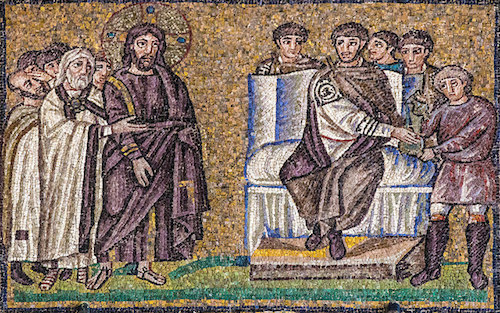We run our website the way we wished the whole internet worked: we provide high quality original content with no ads. We are funded solely by your direct support. Please consider supporting this project.

A Kingdom Not of This World
In the previous post, I introduced how Jesus directly taught against the favored nation status of Israel, an theme that runs throughout his ministry. For example, Yahweh’s Sinai covenant with Israel was rooted in a system of immediate rewards and punishments. Jesus not only canceled these covenantal promises; he sometimes explicitly reversed them. The Sinai covenant taught that those who obeyed God would be blessed with food and wealth, for example, while disobedience would result in hunger and poverty (e.g. Deut 27-28). Yet, Jesus pronounced woes on those who were well fed and wealthy while promising blessings to those who were hungry and poor (Lk. 6:20-21; 24-25).
Similarly, under the Sinai covenant those who obeyed God were promised they’d enjoy military victories over enemies and would possess the promised land. By contrast, Jesus taught that the humble and meek would inherit the earth, while those who showed mercy toward enemies and who were peacemakers would be blessed (Matt 5:5, 7,9; Lk 6:2).
Jesus’ assault on the Jewish nationalistic spirit of his day can also be seen in his interaction with a Roman Centurion (Mt. 8:5-10). Jesus not only obliged this commander’s plea to heal his servant; he commended his faith as being greater than that of any Jew he’d encountered. In the minds of many of his contemporaries, the Messiah was supposed to incite vengeance against officers like this, not serve them and praise them!
Along similar lines, Jesus violated customary Jewish taboos about fellowshipping with Samaritans, whom most Jews regarded as even further outside God’s favor than Gentiles. He even went so far as to make a hero of a Samaritan in one of his parables, contrasting his kindness with the calloused response of a Jewish priest and a Levite in the process (Lk 10:29-37).
Yet, Jesus’ most explicit repudiation of the nationalistic understanding of divine favor came in response to Pilate’s question about whether or not he was “king of the Jews.” Pilate was naturally wondering whether Jesus regarded himself to be on a par with, and therefore in competition with, his position as ruler of the land. “My kingdom is not of this world,” Jesus replied, citing the fact that his followers were not fighting on his behalf as proof of his claim (Jn. 18:36). Jesus was acknowledging that he was indeed a king, but not over any particular geographical region, any particular people, or any particular political regime. He was thus declaring that his kingdom was no more aligned with the nation of Israel than with any other nation. Whatever God was up to in working with a “favored” nation in the past, it’s evident that Jesus believed this nationalistic program had come to an end with him.
While it took some time for the Spirit to overcome the deeply entrenched nationalism and racism of Jesus’ earliest disciples—remember, some of them were expecting Jesus to restore Israel even after the resurrection (Acts 1)—we see Jesus’ trans-nationalistic view of the kingdom evidenced throughout the New Testament. In Jesus, Paul says, the distinction between Jew and Gentile has been abolished and “the dividing wall of hostility” has been “destroyed.” Indeed, in Christ God has created “one new humanity,” replacing the old fragmented humanity in Adam (Eph. 2:11-17). Hence, there is in Christ no longer any place for attaching any significance to one’s nationality or ethnicity—or, Paul adds, to one’s social standing, wealth or gender (Gal. 3:28).
Photo credit: Lawrence OP via Visual hunt / CC BY-NC-ND
Category: General
Tags: Israel, Kingdom of God, Nationalism
Related Reading

The Kingdom Stance Toward Enemies
Jesus was praying in the garden of Gethsemane, when a group of temple guards showed up to arrest him. Peter immediately drew his sword and started swinging it, cutting off a guard’s ear. From the world’s point of view, this violence was justified. Peter was simply defending himself and his master. Yet Jesus rebuked him,…

The Destiny of God’s People
Jesus represents the realization of God’s glorious dream for humanity. In Christ, we see what we who are in Christ are destined to be. As a stick placed in a river is destined to be carried to whatever body of water the river runs to, so all who have allowed themselves to be drawn by…

God is Flexible: Romans 9, Part 4
As we continue this series on Romans 9, [Here’s the link to the first post in the series.] today we will look at the famous potter/clay analogy. Most tend to interpret the potter and clay image as supporting the deterministic view of God. But in fact, it teaches just the opposite. This is the fifth argument…

Incarnation and Covenant
The most distinctive aspect of Jesus’ identity, according to the faith of the historic-orthodox Church, is that Jesus is fully God and fully human—“God Incarnate,” to use the Church’s creedal phraseology. To accurately reflect on the Incarnation, we must avoid the temptation to think abstractly, treating the doctrine of the Incarnation as a mere metaphysical…

Does Romans 13 Condone Government Violence? (podcast)
Greg deconstructs problematic interpretations of Romans 13. Episode 649 http://traffic.libsyn.com/askgregboyd/Episode_0649.mp3

Jesus, the Light that Blesses
God spoke a promise to Abraham in Genesis 12 that his descendants would be a great nation and that all of the nations would be blessed through him. In this sermon clip, Greg discusses how Jesus became the new Israel that would bring a blessing to all people. You can find the full sermon as well…
